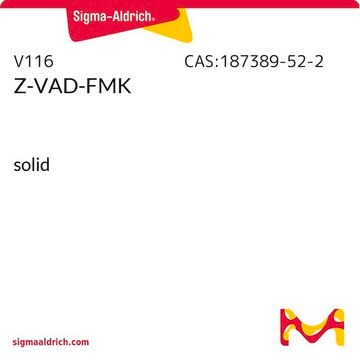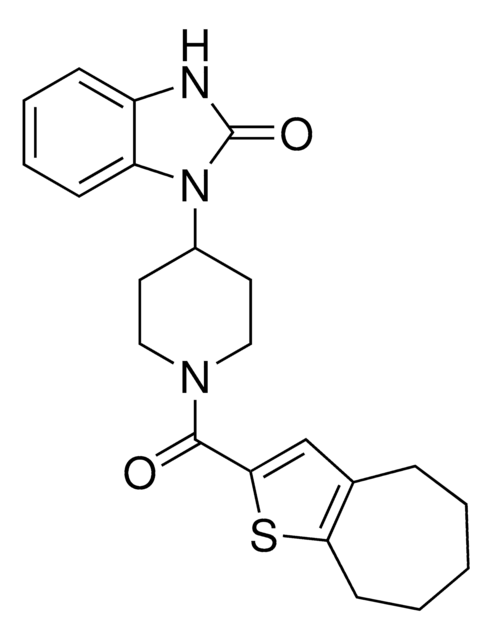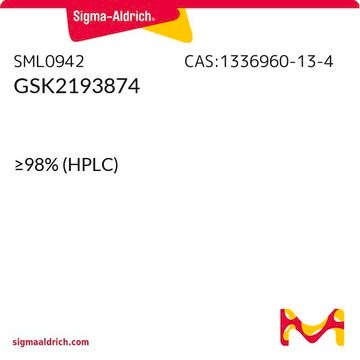SML1596
PPZ2
≥98% (HPLC)
Synonym(s):
2-[4-(2,3-Dimethylphenyl)piperazin-1-yl]-N-(2-ethoxyphenyl)acetamide, 4-(2,3-Dimethylphenyl)-N-(2-ethoxyphenyl)-1-piperazineacetamide
Sign Into View Organizational & Contract Pricing
All Photos(1)
About This Item
Empirical Formula (Hill Notation):
C22H29N3O2
CAS Number:
Molecular Weight:
367.48
UNSPSC Code:
12352200
NACRES:
NA.25
Recommended Products
Quality Level
Assay
≥98% (HPLC)
form
powder
color
white to beige
solubility
DMSO: 5 mg/mL, clear (warmed)
storage temp.
2-8°C
Biochem/physiol Actions
PPZ2 selectively activates DAG-activated TRPC3/TRPC6/TRPC7 channels. PPZ2 activates native TRPC6-like channels in smooth muscle cells isolated from the rabbit portal vein. PPZ2 induces BDNF-like neurite growth and neuroprotection in cultured neurons.
TRPCs are cation channels, mainly permeable to Ca2+ ions. TRPC6 plays a crucial role in tumor development. TRPC3 controls fibronectin expression, thereby regulating wound healing process. TRPC7 is involved in the proliferation of osteoblasts.
Storage Class Code
11 - Combustible Solids
WGK
WGK 3
Flash Point(F)
Not applicable
Flash Point(C)
Not applicable
Certificates of Analysis (COA)
Search for Certificates of Analysis (COA) by entering the products Lot/Batch Number. Lot and Batch Numbers can be found on a product’s label following the words ‘Lot’ or ‘Batch’.
Already Own This Product?
Find documentation for the products that you have recently purchased in the Document Library.
Hisako Ishise et al.
Scientific reports, 5, 11620-11620 (2015-06-26)
Wound healing process is a complex and highly orchestrated process that ultimately results in the formation of scar tissue. Hypertrophic scar contracture is considered to be a pathologic and exaggerated wound healing response that is known to be triggered by
E Abed et al.
Cell proliferation, 40(6), 849-865 (2007-11-21)
Bone tissue in the adult is continuously being remodelled, and overall bone mass is maintained constant by the balance between osteoclastic bone resorption and osteoblastic bone formation. Adequate osteoblastic proliferation is essential for both appropriate formation and for regulation of
Shanshan Li et al.
Journal of cell science, 128(17), 3317-3329 (2015-07-19)
Hypoxia-inducible factor-1 (HIF-1) is a key transcription factor responsible for the expression of a broad range of genes that facilitate acclimatization to hypoxia. Its stability is predominantly controlled by rapid hydroxylation of two proline residues in its α-subunit. However, how
Chang Zeng et al.
Molecular neurobiology, 52(1), 562-572 (2014-09-13)
Temporal lobe epilepsy (TLE) is the most common form of intractable epilepsy and is always accompanied with hippocampal sclerosis. The molecular mechanism of this pathological phenomenon has been extensively explored, yet remains unclear. Previous studies suggest that ion channels, especially
Our team of scientists has experience in all areas of research including Life Science, Material Science, Chemical Synthesis, Chromatography, Analytical and many others.
Contact Technical Service








